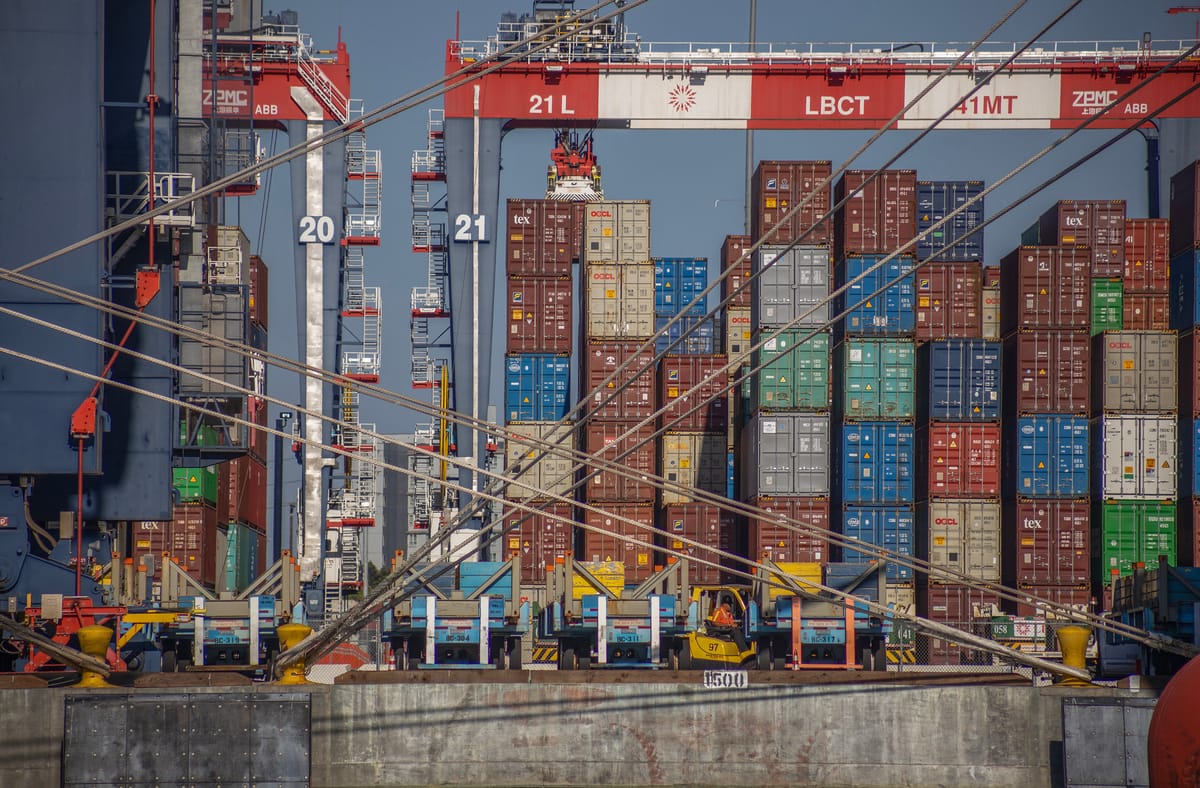East, Gulf coast dockworker strike appears likely. LA and Long Beach are ready
Negotiations have been stagnant for months and, with the Oct. 1 strike looming, the Biden administration says it won't intervene.

The San Pedro Bay ports in Long Beach and Los Angeles already are moving record volumes of cargo. With a dockworker strike at East and Gulf coast ports becoming more likely, the busiest port complex in the country says it's ready for even more.
Since May, the International Longshoremen’s Association, which represents more than 85,000 dockworkers, and the United States Maritime Alliance, or USMX, which represents container carriers, terminal operators and port associations, have been in heated contract negotiations. Talks have been stagnant for months, the old contract expires at the end of the month and the union president says workers will walk off the job Oct. 1 if a new contract is not in place.
Many container ships have already been diverted to West Coast ports due to the uncertainty of the labor negotiations, but also high consumer demand, security concerns in the Red Sea and drought conditions at the Panama Canal. If a strike occurs at the dozens of ports from the Gulf of Mexico to Maine, volumes in the San Pedro Bay could increase further.
“Should the need arise, we will depend on the close relationships we have developed with our partners in industry and labor to work to keep the supply chain moving, and the U.S. economy functioning,” Port of Long Beach CEO Mario Cordero said in an email Wednesday.
In August, Long Beach moved the most containers ever in a single month at 913,873 20-foot-equivalent units, or TEUs, breaking the previous record of 907,216 set in May 2021. On Sept. 12, the port stated it is operating at about 75% capacity.
Similarly, the Port of Los Angeles is operating at about 80% of its 1.2 million TEU monthly capacity, according to Executive Director Gene Seroka.
“Here in Los Angeles, we’re ready to adapt to the increasing demand and meet the needs of our customers,” Seroka said during a live news briefing on Sept. 18.
While his and the Long Beach port are ready to handle additional cargo, Seroka admitted that a mass shutdown on Oct. 1 would certainly have negative fallout on the economy.
“All of our ports nationwide have to be running at top speed to fuel this economy,” he said.
“This has been a longtime coming to make sure that our workforce is paid appropriately coming off of all the work they did during the COVID surge,” Seroka continued. “And it’s not just in our industry, but across a broad group of organized labor forces that have been going to work day in and day out to help this American economy.”
Seroka was joined by George Goldman, president and CEO of shipping company CMA GCM (North America), a member of USMX, who said a single day shutdown is too long.
“The reality is we are in a fluid supply chain process. The moment you close the door, things begin to back up,” Goldman said. “So we are not in any way looking forward to having any shutdown on any coast.”
The union, for its part, says the month-long stalemate is the result of employers like CMA CGM offering an “unacceptable wage increase package.”
“My ILA members are not going to accept these insulting offers that are a joke considering the work my ILA longshore workers perform, and the billion dollar profits the companies make off the backs of their labor,” ILA President Harold Daggett said in a recent statement. “The blame for a coast wide strike in a week that will shut down all ports on the Atlantic and Gulf Coasts falls squarely on the shoulders of USMX.”
USMX, meanwhile, maintains its attempts to reignite negotiations in good faith are being brushed off by the union, adding that it is in contact with the Department of Labor, the Federal Mediation & Conciliation Service and other federal agencies. The organization filed an unfair labor practice charge against the union with the National Labor Relations Board in an attempt to force them back to the bargaining table.
In a Sept. 17 letter to President Biden, a group of 177 trade associations led by the National Retail Federation urged the administration to help reach a resolution in the contentious negotiations. Presidents can intervene in some labor disputes by implementing an 80-day cooling-off period under the Taft-Hartley Act.
As was the case with a potential railroad strike in 2022, Congress also can step into the fray and pass a contract in the form of legislation, which also must be signed by the president.
The Biden administration, however, has already signaled it will not block a strike, despite this being a presidential election year.
"We've never invoked Taft-Hartley to break a strike and are not considering doing so now," a Biden administration official told Reuters earlier this month. "We encourage all parties to remain at the bargaining table and negotiate in good faith."

We need your support.
Subcribe to the Watchdog today.
The Long Beach Watchdog is owned by journalists, and paid for by readers like you. If independent, local reporting like the story you just read is important to you, support our work by becoming a subscriber.





